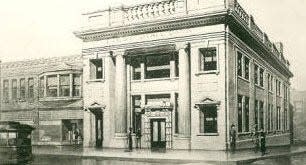Steve VanderVeen: The story behind Holland's most politically connected law practice
Diekema, Kollen and Ten Cate — located on the second floor of First State Bank at 2 E. Eighth St. — was Holland’s most politically connected law practice.
More:Henry and Anna Post ensured Holland's economic viability
More:George Hummer and the creation of West Michigan Furniture
More:Arend Visscher and James Huntley lived on a hill
Gerrit John Diekema was born in Holland in 1859. He attended Hope College and earned his law degree from the University of Michigan in 1883. Oration was his special gift. In 1885, while serving as city attorney, the people elected him to the state legislature.
In 1886, he co-founded — along with John C. Post, George Hummer and others — Macatawa Boat Club. In 1889, he became Michigan’s Speaker of the House.
In 1892, Diekema invested in Alfred Huntley’s Wolverine Light and Power Company, along with John W. Beardsley, Isaac Marsilje, Jacob Van Putten and Germ Mokma. But this time, Holland’s citizens voted against him in favor of a municipal power plant.

Still, in 1895, local citizens elected Diekema mayor of Holland. That year, Diekema and Henry Kremers, Isaac Cappon, John C. Post, Patrick McBride and Arend Visscher formed the Holland Improvement Company to develop Prospect Park — creating a home for industry, houses and a park in between.
The industrial park became home to the Bush and Lane Piano Company and the Holland Furnace Company. In 1896, Diekema served as delegate to the Republican National Convention.
From 1900-1910, Diekema served as chair of the Michigan Republican Party. In 1906, he was a founding director of the DePree Chemical Company. In 1907, the people elected him to the U.S. House of Representatives.
In 1915, Diekema served as president of First State Bank. In 1917, he served as president of the Ottawa County chapter of the American Red Cross. In 1918, Diekema and friends persuaded the H.J. Heinz Company to build a plant in Holland, on land his father, Wiepke, had purchased from the Odawa (Ottawa).
In 1923, Diekema served on the board of the Holland Maid Company and advocated for the building of the Warm Friend Hotel. In 1925, he lobbied for the water treatment plant at River Avenue and First Street. He also supported Nellie Churchford.
Subscribe:Learn more about our latest subscription offers!
In 1927, Diekema again served as chair of the Michigan Republican Party. In 1929, President Hoover appointed him U.S. Ambassador to the Netherlands. He died there in 1930.
Diekema’s brother-in-law was George Kollen. Kollen was born in Holland in 1871. He served as city attorney from 1895-1905.
In 1897, Kollen secured the right-of-ways for the Holland and Lake Michigan Railway Company to run its “Interurban” electric line from the east end of Eighth Street to River Avenue, to 13th Street, to Harrison Avenue, to 16th Street, to Ottawa Avenue, to 24th Street, to Jenison Park.

In 1908, Kollen invested in the recapitalized Thompson Manufacturing Company, a maker of residential furniture, operated by Charles M. McLean and Cornelius Vershure. In 1915, Kollen and investors purchased land from the creditors of the C.L. King Company. They then sold to the DePree Company.
In 1916, Kollen served on the Holland’s first hospital committee. He also became the first president of the Superior Foundry Company located at the corner of Eighth Street and Fairbanks Avenue. The company received financial backing from the Holland Bonus Committee and political backing from Holland City Council, which conveniently repealed — against protests from the neighbors — an ordinance forbidding noxious industries from building in residential neighborhoods.
George Kollen died in 1919. In 1921, his wife — Martha Diekema Kollen — purchased the former C.L. King property from the DePree Company and donated the land to the city, stipulating it become a public park named after her husband.
Gerrit Diekema’s nephew was Daniel Ten Cate. Ten Cate was born in 1877. He attended Hope College and earned a law degree from the University of Michigan in 1902.
In the late teens and early 1920s, one of Ten Cate’s clients was James Himebaugh, owner of Holland’s Strand Theater, located at 9 W. Eighth St. Himebaugh frequently battled Holland’s Board of Motion Picture Sensors, which had the power to ban scenes from films.
Over the years, Ten Cate was a board member of the Home Furnace Company, DePree Company, People's State Bank, Holland State Bank and the Ottawa Savings and Loan Association.
After Gerrit Diekema became Minister to the Netherlands, Judge Orien Cross became a member of the law firm. When he retired, Ten Cate’s son Vernon joined the firm, which father and son renamed Ten Cate and Ten Cate.
Information for this article comes from Robert Swierenga’s "Holland, Michigan," Randy VandeWater, newnetherlandinstitute.org, Wikipedia and the city of Holland.
— Community Columnist Steve VanderVeen is a resident of Holland. Contact him through start-upacademeinc.com.
This article originally appeared on The Holland Sentinel: Holland History: The story behind Holland's most politically connected law practice
